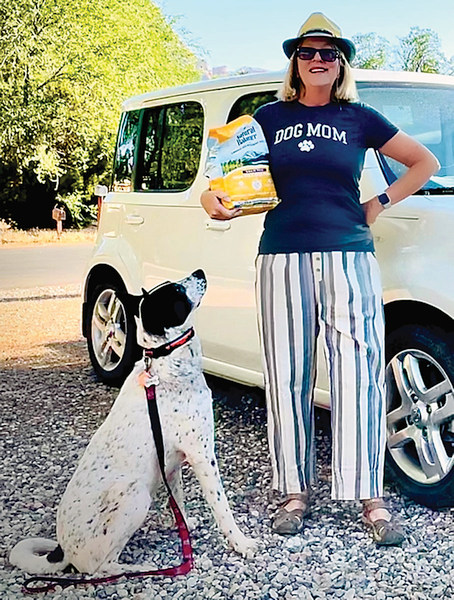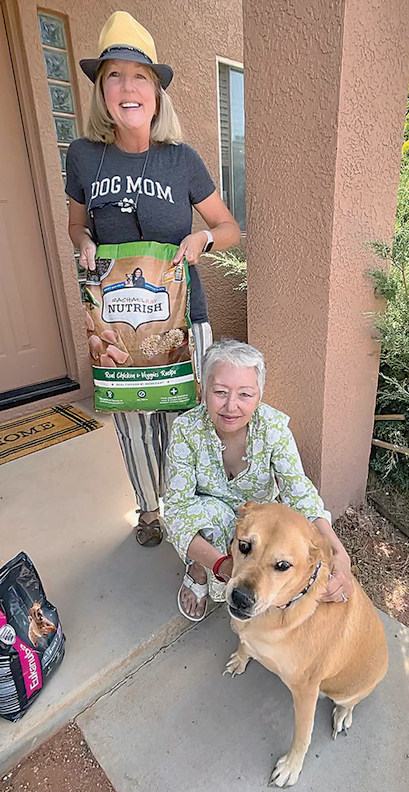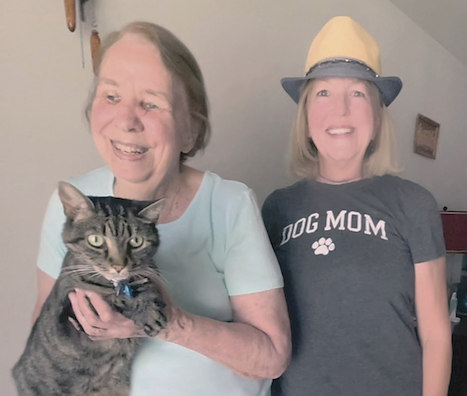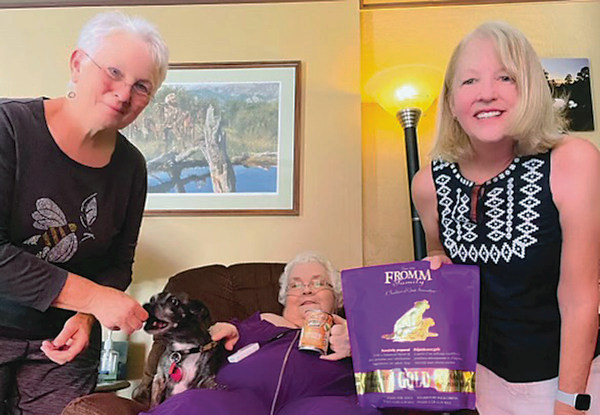Story & photos by Shari King
It’s no secret that there are many wonderful benefits to owning pets. For our seniors, it may be even more so. Pets provide routine and a sense of purpose, and numerous studies have shown that companionship with a pet reduces the sense of isolation and loneliness.
A dog gets a person out of the house and exercising in the fresh air and sunshine. Walking dogs helps our seniors to be more socially interactive and helps to make friends. Owning a dog provides protection and a feeling of safety, while petting a purring cat reduces stress, lowers cortisol levels and raises serotonin, the feel-good hormone.
But what if a pet owner on a limited budget or disability is unable to provide healthy pet food or healthcare to their beloved pets? That answer became crystal clear to some of the volunteers of the Sedona Community Center and the Meals on Wheels (MOW) program.

In 2008, Carolyn Bills overheard a phone conversation an elderly woman on the MOW program was having with the Operations Officer of the community center. The woman confessed that she was sharing her MOW meals with her dog. Thus began the Sedona Pet Project.
Bills brilliantly linked a monthly petfood delivery program to MOW. “The idea of a pet program quickly spread through the community center and is now an important part of MOW.” Her brilliant idea has apparently caught on nationwide, too.
In 2019, PetSmart charities funded Meals on Wheels America for a three-year partnership. Their goal is to provide home-delivered pet meals and veterinary care to pets of homebound seniors, as well as fund research to understand the needs of their clients and the challenges they face every day. In fact, research done by Meals on Wheels America found that seniors with pets are less likely to exhibit depression, report feelings of loneliness or experience illness.
Bills said, “The great thing about combining these two efforts is that we see our seniors Monday through Friday, and we can get a peek inside [their lives] and ask how everybody is doing. Is everybody okay?” The program currently services ten to twenty clients at any given time and spends over $500 monthly, which is paid through donations and grants.
Bills has spent hours scouring the local pet food vendors to find the best price for the highest quality foods, and with good reason. Feeding pets a good quality pet food is essential to maintain the health and well-being of an animal.
Good quality pet foods are unrefined, minimally processed, and balanced with whole grains and healthy fats and proteins. Unfortunately, they can be costly for a senior on a limited budget.
Said Bills, “We could buy cheaper food, but good quality food helps cut down on the vet bills. The Pet Project does help with a small portion of veterinary costs—but just a portion—and we all know how expensive veterinary visits can be.”
The less expensive, poor quality pet food Bills refers to are kibble loaded with preservatives, artificial flavors, fillers and dyes. These foods are directly linked to diabetes, obesity, urinary tract disease, arthritis and joint pain, and poor coat quality. Add expensive veterinary visits to a senior’s limited budget, and one can immediately appreciate the need for a discerning shopper like Bills.

“It would be impossible to thank every single person or business who has helped us with this program throughout the years. We are so grateful to all of them,” said Bills. She added that she frequently relies on the generosity of the Sedona Ace Hardware. “They’ve donated sample bags of different diets—food that was not selling well or foods close to expiration.” She also said the Feathers and Fur Pet store in the Village of Oak Creek has been very generous and amazes her with their pet food contributions, and also Golden Bone for their help with specialty diets.
Debra Thomas, a recipient of the pet program since 2012, is undergoing chemotherapy and has a female yellow lab named Pond with an immune mediated disease that inflames the dog’s mouth and throat and makes her unable to chew kibble. The Sedona Pet Project is providing canned food for Thomas to keep Pond healthy and with her owner as long as possible.
“Pond is a rescue that was found in terrible condition,” Thomas said. “She was starving in the desert after delivering a litter of puppies when she was only six months old. She then spent six months in isolation at a shelter after getting very sick from the pups. Even after all that she went through, she is the best dog we’ve ever had. When I am sick from the chemo, she is right next to me.”
Thomas said that Pond recognizes the car from Thomas’s MOW driver and gets super excited and barks and wags her tail while waiting for the delivery.
The program volunteers recognize the importance of even healthy pets maintaining their same diet since switching pet foods abruptly can result in diarrhea, which could be a nightmare for someone confined to a bed or dependent on caregivers for their mobility.
Bills came up with a clever solution, saying, “Sometimes if a pet is on a special diet or prescription diet that just isn’t available, I printed up flyers with instructions to mix half of the new pet food with half of what they have left over, and we have the driver leave that attached to the bag for the owner.”
After a sad event with a client, Bills created a pet release guardianship form for MOW clients to post on their refrigerator. “We had an elderly man who was hospitalized for quite a long time, and animal control came and took his dog,” she explained. “The man’s neighbor went to get the dog but was unable to take the dog home because the neighbor didn’t have any proof of guardianship. That dog was in the shelter for far too long.”
So now the Sedona Pet Project volunteers are making sure that, in addition to having nutritious foods delivered to their home, their clients also have plans for their pets. Bills said, “We ask them what they would do with their dog if something should happen to them? Where would they want their cat to go? None of them ever want their animals to go to a shelter. We ask them to have a neighbor or friend sign a guardianship form and have them post it on their refrigerator.”
The program is not limited to just dogs and cats owned by a client on MOW. Bills said, “We currently have a client with a cockatoo and a gentleman who feeds his backyard birds. Those wild birds mean everything to him.”
In addition to the program providing free pet food to people on MOW, the program also includes limited vet care, pet transport, trips to the groomer, and other services.
Bills said, “We unfortunately have had to help clients with euthanizing their pets. As you can imagine, it’s very sad, especially when you return to that home, and it’s just so quiet and lonely. We do our best to help that client find another pet if that’s what they want.”
The program balances what’s good for the pet as well as for the client, which can’t be easy. Bills shared, “We had to make a difficult choice once with a gentleman and his dog. The man was no longer mobile and wasn’t able to let his dog outside, and we had to find another home for the dog.”

This year, Bills stepped down and Kim Spangler—a volunteer driver for MOW—accepted the position as Pet Project coordinator. Spangler said, “Our goal is to keep the human and pet together in their homes, and to step in when a hardship occurs that makes providing for that pet difficult. We frequently refer our clients to other resources, and we try to answer any questions they have on the best way to provide care for their pets when their life requires change. If something isn’t right or seems wrong with the pet, we will call animal control.”
Spangler is also a volunteer for The Sedona Humane Society. “They’ve been hugely helpful for the program and are a very good organization.”
Spangler notes that many of the recipients of pet food are only on a MOW program temporarily as a result of debilitation from a surgery or illness and are simply unable to get out to shop. Spangler said, “We really shop around to get the best prices, and we also actively collect donated coupons and rebates. We want to provide good foods to these animals, because you know what they say, you are what you eat.”

Spangler has recently contacted Chewy’s, the online pet food and pharmacy giant, to pursue acquiring discounted pet foods and medications for client pets. And, most importantly, for the prescription diets, which can be very costly.
Spangler said, “During the height of the pandemic, we could not go into the client’s house. Now, they can at least meet us at the door, and that way we can also see their dog. It’s wonderful that, in addition to providing a hot nutritious meal, we are also able to do a welfare check on that individual and their beloved pets.”
Client Sandy Merchant hasn’t been out of her house in two years. She said, “This program is literally a lifesaver for me and my little dachshund. Ariel and I are inseparable, and I don’t know how I would have managed without their help. These volunteers are all top of the line.”
For more information about the Pet Project, visit the Sedona Community Center Website at sccsedona.org or phone 928-282-2844. Also visit mealsonwheelsamerica.org

